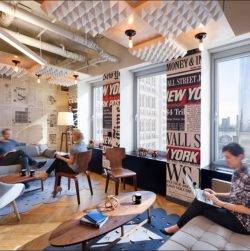January 7, 2019
Firms and their workers need to adapt more quickly to changing world of work
 Governments need to do more to help workers and firms adapt to the fast-changing world of work and drive inclusive growth, according to the new OECD Jobs Strategy. New evidence in the report claims that countries that promote job quantity, quality and inclusiveness – such as Denmark, Iceland, Norway and Sweden – perform better than those which focus predominantly on market flexibility. While flexibility and adaptability are essential to stimulate the creation of high-quality jobs in an ever more dynamic environment, the gains and costs need to be fairly shared between businesses and workers, according to the OECD.
Governments need to do more to help workers and firms adapt to the fast-changing world of work and drive inclusive growth, according to the new OECD Jobs Strategy. New evidence in the report claims that countries that promote job quantity, quality and inclusiveness – such as Denmark, Iceland, Norway and Sweden – perform better than those which focus predominantly on market flexibility. While flexibility and adaptability are essential to stimulate the creation of high-quality jobs in an ever more dynamic environment, the gains and costs need to be fairly shared between businesses and workers, according to the OECD.










 Just three days into the New Year, today (Friday 4 January), the UK’s top bosses will have made more than a typical full-time worker will earn in the entire year, according to calculations from independent think tank the High Pay Centre and the CIPD. The average (median) full-time worker in the UK earns a gross annual salary of £29,574, while the average FTSE 100 CEO, on an average (median) pay packet of £3.9 million, only needs to work until 1pm on Friday 4 January 2019 to earn the same amount. The £3.9 million figure was calculated by the CIPD and the High Pay Centre in their
Just three days into the New Year, today (Friday 4 January), the UK’s top bosses will have made more than a typical full-time worker will earn in the entire year, according to calculations from independent think tank the High Pay Centre and the CIPD. The average (median) full-time worker in the UK earns a gross annual salary of £29,574, while the average FTSE 100 CEO, on an average (median) pay packet of £3.9 million, only needs to work until 1pm on Friday 4 January 2019 to earn the same amount. The £3.9 million figure was calculated by the CIPD and the High Pay Centre in their 
 Office investment volume in Central London in 2018 is expected to come close to £20 billion, despite the ongoing economic and political uncertainties of Brexit. According to Savills London witnessed notably above average levels of office take-up in 2018 and achieved the best ever City of London rent (£80 per sq ft). The list of global businesses committing to long term leases has continued to grow with announcements in the last 12 months from Facebook, LinkedIn and Sidley Austin. The constrained development pipeline has seen more office pre-lets over 50,000 sq ft agreed in 2018 than ever before, while a shortage of available Grade A options has matured into a greater number of development opportunities. Savills also predicts a greater number of value-add and development opportunities coming to the market and that trading in London will insure the ongoing creation of the world’s best office buildings in a city where people will continue to want to work. This in turn creates new investment opportunities for global investors searching for prime assets.
Office investment volume in Central London in 2018 is expected to come close to £20 billion, despite the ongoing economic and political uncertainties of Brexit. According to Savills London witnessed notably above average levels of office take-up in 2018 and achieved the best ever City of London rent (£80 per sq ft). The list of global businesses committing to long term leases has continued to grow with announcements in the last 12 months from Facebook, LinkedIn and Sidley Austin. The constrained development pipeline has seen more office pre-lets over 50,000 sq ft agreed in 2018 than ever before, while a shortage of available Grade A options has matured into a greater number of development opportunities. Savills also predicts a greater number of value-add and development opportunities coming to the market and that trading in London will insure the ongoing creation of the world’s best office buildings in a city where people will continue to want to work. This in turn creates new investment opportunities for global investors searching for prime assets.

















January 4, 2019
Why new technology can still make employees happier, healthier and more efficient
by Elaine Rossall • AI, Comment, Flexible working, Lighting, Technology, Wellbeing
For many years, we became used to new technology being treated with excitement. Essentially, people thought technology made their lives better. More recently this consensus has been tested. On a very practical level, there is growing concern about the impact of everyday technology. ‘Screen-time’ has become a byword for anxiety and disengagement from the real world. Meanwhile, there is trepidation about the impact of future technology, such as the automation of jobs. Whilst caution is needed, there is a danger that we are forgetting the many benefits technology can bring. As an example, look to the workplace. Already, offices are gaining hugely from technology that benefits employee wellness and productivity. However, we have only just begun to feel its impact. A ‘fast’ office may sound like an oxymoron. A building isn’t going to win a 100-metre race. Yet fast offices, which allow employees to control their immediate environment, are becoming increasingly common.
(more…)